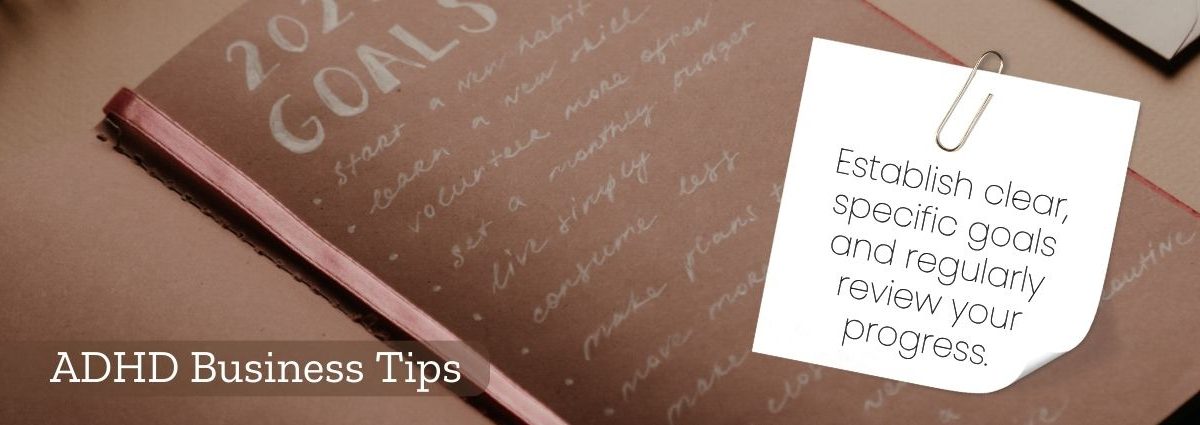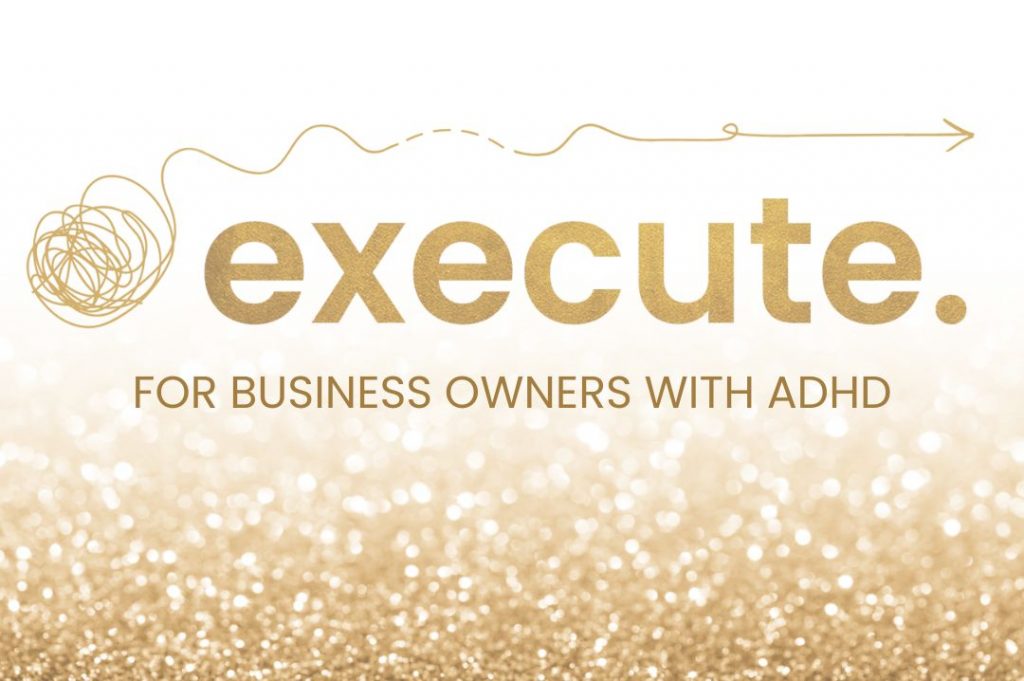When was the last time you set a goal? I’ve found that many of my clients with ADHD will tend to vacillate between two extremes – they’re either prolific goal setters, ever hopeful that the right goal is all they need and will make all the difference, or they’re reluctant to commit to anything even resembling a goal, because they’re buried under a mountain of shame that’s the result of seldom being able to follow through and execute on any goal they’ve ever admitted to setting in the past.
And then there are those who fall in the middle, who will occasionally set some goals in a moment of excitement, perhaps even creating a finely detailed plan to achieve them, but who then get caught up with the busyness of the day-to-day and forget the goals altogether as their carefully crafted plan becomes clutter in a drawer somewhere.
The relationship between a business owner with ADHD and goals can be complex and complicated, often influenced by the unique characteristics of ADHD itself. Some factors that make this relationship more challenging are fluctuating energy levels, resistance to structure, impulsivity, fear of failure and often an overwhelming abundance of ideas. When you add in a need for novelty, the struggle to control hyperfocus and difficulty balancing long term vision with short term wins, you might begin to wonder how anyone could make this goal thing work at all!
While the ADHD mind thrives on spontaneity, the structured world of goal setting can seem like uncharted territory. However, setting clear and specific goals is not just for the neurotypical or Type A meticulous planners amongst us; it can be a compass to guide us toward success. So, let’s untangle the knots around goal setting for entrepreneurs with ADHD.
Why we avoid setting goals
For many entrepreneurs with ADHD, the idea of setting goals can feel constraining. The fear of failure, coupled with the desire for flexibility, often leads to a reluctance to define specific objectives. We may worry that goals will become shackles, limiting our ability to explore inevitable new ideas and follow our creative instincts. Chances are we’ve also had negative experiences with goals or goal setting in the past, whether it involved not a lack of follow through or copping criticism for missing deadlines, it can all contribute to a serious aversion to engaging in the process again.
By far though, the most common reason my ADHD clients are hesitant to ride the goal train is that they aren’t actually 100% clear on what they’re working toward. Their vision for the future is a weird combination of their ultimate dream life – which is still quite fuzzy – coupled with some things they’ve set out to do more recently and are currently on their to do list. It can be almost impossible to see how the two timelines connect and how the “now” might lead to the “then”. Sometimes this lack of clarity comes from having never properly considered the future, sometimes it’s the result of not having the words to describe it, and sometimes it’s simply a way to leave doors open that feel like they might close should a destination be chosen.
Less is more
Despite initial resistance, with the right support goal setting can be a game changer. Goals can provide us with direction, focus, and a framework for success. It’s not about setting an overwhelming number of goals; in fact, I recommend fewer goals, and not just for my neurodivergent clients.
Clear, concise goals allow for better concentration and reduce the risk of feeling overwhelmed. Instead of scattering our energy across numerous objectives, having a few well-defined goals allows us to channel our creativity effectively, minimise possible distractions and *hopefully* better leverage our hyperfocus.
How to set clear, specific goals
There are a number of methods and strategies for setting goals the “correct” way and if they work for you, use them! If they make the process harder or too complicated to be useful keep these factors in mind:
- Simplicity is key: Keep your goals simple, straightforward and few (I recommend 1-3 per quarter or 3-5 for the year). Avoid the temptation to create overly complex objectives that might become confusing or cause you to lose interest.
- Be specific: Define your goals with clarity. Instead of a broad aim like “increase sales,” get clear on the specific target, such as “increase monthly sales by 15% in the next quarter.” The more explicit you are the easier it is to assess how you’re tracking.
- Prioritise: Identify the most critical goals that align with your overall plans for your business. Prioritisation ensures that you focus on what truly matters so your limited time and energy will be well spent. Remember, the ADHD brain tends to be overly optimistic about how much can be done in a given period so be prepared to cut half (or more) off your original list if needed.
Create time for regular goal check-ins and reviews
Once you’ve settled on a few clear and specific goals it’s important to keep them front of mind, so you don’t forget your original intention/s. Taking the time to regularly check in and review your progress will not only help you remember what you’re working toward but it will also make your day-to-day work easier as you’ll have greater clarity around what should be on your to do list this week, and how it relates to the bigger picture. These are my top tips when it comes to monitoring your progress:
- Set regular checkpoints: Establish specific times, whether weekly, bi-weekly, or monthly, to review your goals. This routine helps build consistency. If you have a coach your sessions together will serve perfectly as checkpoints. In Execute we have a weekly accountability thread as well as regular check in sessions where members can share their progress and get support when things are going awry!
- Create prompts or reminders: Leverage digital tools or set up reminders to prompt you to review your goals. This ensures that they stay top of mind amid the daily hustle. You can even build a daily goal check in into your daily start up routine to help you stay focused on what’s really important.
- Celebrate Progress: Celebrate small wins along the way. Acknowledging achievements boosts motivation and reinforces the positive aspects of goal pursuit. If you don’t have anyone to share your progress with, head over to the Next Level ADHD Entrepreneurs group and let us celebrate with you!
TRY IT OUT:
If you want to get better at setting clear, specific goals and focusing on what’s most important, check out my Fast Track to Focus workbook. It’s designed to help clear the clutter that ADHD brains tend to collect, so you can use your limited time and energy to get on with your most impactful work. Download your free copy here: nextlevelyou.com.au/focus
Setting and reviewing goals can certainly lack appeal for the ADHD entrepreneur, but it doesn’t have to be a rigid or inflexible process. With the right tools and support it can become a dynamic, flexible practice that helps us build momentum and propels us forward. By embracing simplicity, specificity, and regular check-ins, we can turn goal setting into a powerful ally on our journey rather than the scary bogeyman we’re running hide from!
I’ll see you back here next week!

P.S. Can you believe it’s almost December!? 🤯 That means the next Execute Quarterly Planning session is just around the corner – as is Christmas.. If you want to start 2024 off on the right foot, join us before December 11 to make the call!
Click here to get these tips delivered directly to your inbox at the start of each week!


